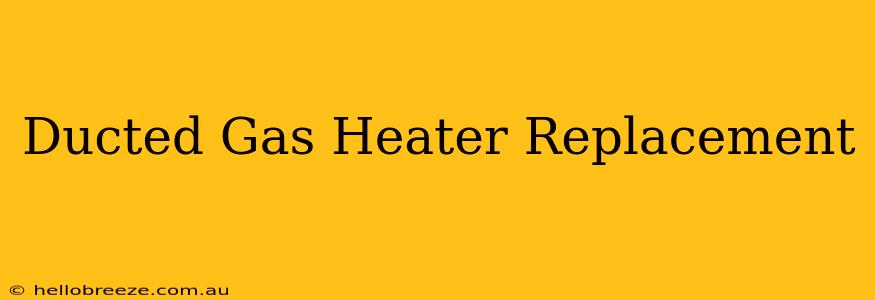Is your old ducted gas heater struggling to keep up? Are your energy bills skyrocketing? It might be time for a ducted gas heater replacement. This comprehensive guide will walk you through everything you need to know about upgrading your heating system, from understanding the signs it's time to replace your heater to choosing the right replacement and navigating the installation process.
When Should You Replace Your Ducted Gas Heater?
Several factors indicate it's time to consider a ducted gas heater replacement:
1. Age and Inefficiency:
Older ducted gas heaters are often less energy-efficient than newer models. If your heater is more than 15 years old, it's likely consuming more gas than necessary and costing you more money. Replacing your old heater with a modern, energy-efficient model can significantly reduce your energy bills.
2. Frequent Repairs:
Constant repairs are a major sign your heater is nearing the end of its lifespan. The cost of repeated repairs can quickly outweigh the cost of a ducted gas heater replacement. If you're constantly calling a technician, it's a clear indication that a replacement is a worthwhile investment.
3. Poor Heating Performance:
Is your home unevenly heated? Do some rooms remain consistently cold, even when the heater is running? This could indicate problems with your ductwork or a failing heater. A new ducted gas heater will ensure even heating throughout your home.
4. Safety Concerns:
Gas leaks, unusual noises, or strange smells are serious safety concerns. Never ignore these signs. If you suspect any safety issues with your heater, immediately contact a qualified gas fitter. A ducted gas heater replacement might be necessary to address these safety concerns.
5. Rising Energy Costs:
Notice a significant increase in your gas bills? This could be a sign of inefficiency in your heating system. A modern, energy-efficient ducted gas heater will significantly reduce energy consumption and lower your bills.
Choosing the Right Ducted Gas Heater Replacement
Replacing your ducted gas heater requires careful consideration. Here's what to keep in mind:
1. Size and Capacity:
The size of your heater needs to match the size of your home. A correctly sized heater ensures optimal heating performance and efficiency. An undersized heater will struggle to heat your home properly while an oversized one will cycle on and off frequently, leading to increased wear and tear.
2. Energy Efficiency:
Look for heaters with a high star rating. The higher the star rating, the more energy-efficient the heater. Energy efficiency directly translates to lower energy bills and a smaller environmental footprint.
3. Features and Functionality:
Consider features like zoning (allowing you to heat only specific areas of your home), programmable thermostats, and remote control capabilities. These features can improve convenience and further enhance energy efficiency.
4. Budget:
Ducted gas heater replacements can range in price depending on size, features, and brand. Set a realistic budget before you start shopping to ensure you choose a heater that meets your needs and financial constraints.
The Installation Process:
Replacing a ducted gas heater is a complex task that should always be handled by a qualified and licensed gas fitter. Attempting DIY installation can be dangerous and could void any warranties.
A professional installation will ensure:
- Proper sizing and placement: Ensures optimal heating efficiency and safety.
- Safe gas connections: Prevents gas leaks and potential hazards.
- Correct ductwork integration: Ensures even heat distribution throughout your home.
- Compliance with safety regulations: Peace of mind knowing the installation meets all necessary standards.
Replacing your ducted gas heater is a significant investment but offers substantial long-term benefits. By carefully considering the factors outlined above, you can choose the right heater and ensure a comfortable, efficient, and safe heating system for years to come. Remember to always prioritize safety and hire a qualified professional for installation.

